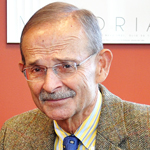Chris Weiler started his first job as a paperboy at the age of eight, and he hasn’t stopped working since. The cofounder of two litigation services companies currently serves as president of LDiscovery and also coaches a local high school football team. A former college athlete and naval officer, Weiler is a strong believer in putting the team before the individual. “It’s all about beating with one heart,” he says. Here, he discusses how LDiscovery has been able to increase efficiencies without losing the heart of the business, as well as how his passion for sports fuels his corporate philosophy.
How has your history as an athlete shaped who you are today?
Chris Weiler: I think if you’re into athletics you love to compete, and you love to win. So as an athlete and as a coach, my mind-set has always been about preparing the team, competing as hard as we can, and winning—because there’s nothing better than winning, but winning the right way. So I think if you have that competitive spirit, it’s never over until it’s over. You can always throw a Hail Mary at the end of the game—when everyone thinks you’ve lost it, there’s always a chance to come back from a game or win a proposal, even if it looks like the odds may be stacked against you.
What motivated you to become an entrepreneur?
Weiler: I looked at my career in the US Navy, and then when I got out and went to work for Pitney Bowes Management Services, I realized I had a very long career path where it would take me fifteen to twenty years to become the captain of a ship, and then the same for a major corporation. It usually takes a long time for someone to ascend up the corporate ranks in order to become the CEO, so what appealed to me is that when you run your own company, you have the ability to run things and make your own decisions, right out of the gate. If you’re creative and innovative, and you work hard, and you’re a good leader, you have the ability to get done in ten years what it would take you twenty or thirty years in the corporate world or the military to obtain.
What gave you the idea to start LDiscovery?
Weiler: I think LDiscovery was a natural progression from the first company I started—On-Site Sourcing. My career has mirrored or followed the path of the evolution of legal technology. Twenty years ago, when everything was paper, we did a lot of copying and scanning of documents, and as the technology evolved, the e-discovery and computer forensics field started to become very important. People are using their computers, they’re creating files, and they’re sending e-mails and text messages, so LDiscovery was just the natural progression of what I’ve always done. It’s a technology-enabled service company in the legal business.
How does LDiscovery use technology to increase efficiencies?
Weiler: Our main objective is to collect data from corporate servers and to process that data into large databases as quickly as possible, and then host that data so that our clients or the government can review those documents. Over the past ten years, we’ve gotten very efficient by automating processes that we used to do manually. For example, years ago we would have to kick off and manually convert documents or do password cracking, and now that’s all been virtualized and distributed, so once we kick off the process we programmatically solve things instead of using human beings. Ten years ago, you had to use a lot of bodies to crack passwords, and now we have scripts and programs. So if a file has a password, it’s kicked into a bin, and then the computer programs check it, break the password, and then the data goes into the database. We’ve automated as many processes as we possibly can and continue to do that today.
Is maintaining company morale an issue when decreasing human resources?
Weiler: It hasn’t been up to this point because we have hired very smartly, meaning we don’t hire someone unless we’re very sure that we need that individual. Our people have embraced us increasing the efficiency and productivity of our workflow because it makes their lives easier, it’s more technology-enabled, and it has also allowed us to be more profitable, which has allowed them to receive higher bonuses and higher profit sharing.
How do you use your coaching and leadership skills to run your business?
Weiler: When you’re a coach, there’s a balance between the expectations and the bars you set for people and being a cheerleader. Being a cheerleader is a big thing, providing very positive motivation. But putting people in the right spots is also really important as a CEO and a coach. You don’t want the quarterback playing defensive back, and you don’t want the kicker playing the tight-end position. When you’re running a company, much like when you’re running a sports team, you’re always searching to make sure you put people in the right spots to maximize their productivity within the organization.
You’re also father to three athletes who have played sports at Division 1 schools. How do you find the time to coach all of your teams?
Weiler: I don’t have any hobbies—I’m very much a public servant in the general sense of always trying to put others before myself. I think when you do that, you have a lot more time than you think. All things are possible—you only live once, so you have to go after as many things as you can.

